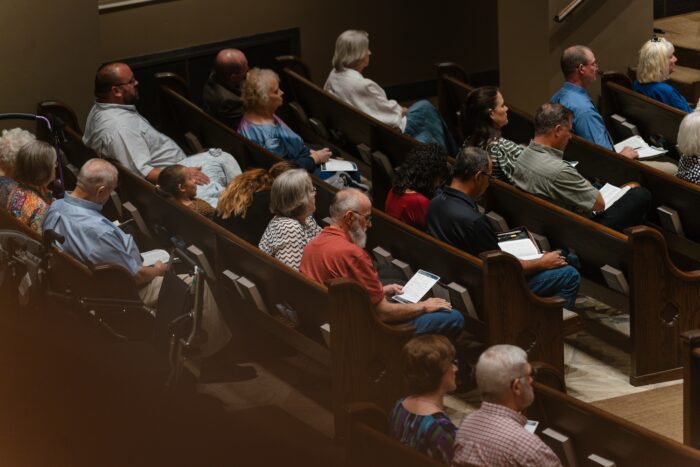Much has been written about Jonathan Edwards’s Sinners in the Hands of an Angry God, probably the most famous sermon in North American history. A large book could be written on the many ways this sermon has been interpreted. My aim here is simple: to offer several reflections as to why this sermon—written over two and a half centuries ago—still attracts attention. We should be surprised by its continuing appeal, however. Few pastors today utilize the Puritan “Plain Style” that Edwards used, where a “doctrine” (i.e. a theological “big idea”) is derived from a brief Scripture text, extensively explored, and finally applied with spiritual precision. Still fewer preach on hell in their evangelistic endeavors. When was the last time you, reader, heard or delivered an entire sermon on hell? Yet Sinners still fascinates us. Below I present several observations on the power and the effectiveness of this sermon. But first, two preliminaries are in order.
First, Edwards preached Sinners during the First Great Awakening at Enfield, Connecticut on July 8, 1741. The response to it was extraordinary: before he could finish, one eyewitness noted that there was “a great moaning and crying out throughout the whole [congregation]: ‘What shall I do to be saved? Oh, I am going to hell.’ … The shrieks and cries were piercing and amazing.” Second, Edwards based the sermon on a phrase from Deuteronomy 32:35, “their foot shall slide in due time,” from which he derived the following doctrine: “There is nothing that keeps wicked men, at any one moment, out of hell, but the mere pleasure of God.” From this starting point Edwards proceeded to the main body of the sermon: beginning with a lengthy exploration of the doctrine and concluding with how its truth applies to his listeners’ lives.
Edwards unpacks the doctrine in a way that shocks and amazes. The fundamental point is quite simple yet terrifying: you really have no control of your eternal destiny whatsoever. Each point in this section (Edwards has ten!) is crafted to make hardened sinners feel the unbearable weight of this. For instance, God can easily consign unbelievers to hell at any moment; any power we think we can marshal against him is fruitless: “Though hand join in hand, and vast multitudes of God’s enemies combine and associate themselves, they are easily broken in pieces; they are as great heaps of light chaff before the whirlwind; or large quantities of dry stubble before the devouring flames.” Similarly, unbelievers may think that their current circumstances and comfort speak to their spiritual safety, yet they are dreadfully mistaken. “The sentence of the law of God … has gone out against them, and stands against them; so that they are bound over already to hell.” Did not Jesus say, “He that believeth not is condemned already” (John 3:18)? Furthermore, the same anger God expresses to those in hell is likewise directed to unbelievers here and now; there is no difference! “The wrath of God burns against them, their damnation don’t slumber, the pit is prepared, the fire is made ready, the furnace is now hot, ready to receive them.” Thus, wherever a sinner turns, the message is the same: your destiny is in God’s hands; he is deeply displeased with you as long as you remain in unbelief; and he may swiftly rectify this situation at any moment if you do not repent and believe!
In the application section, Edwards’s packs Sinners with a forest of memorable images. The most famous of these is the spider: the God who “abhors you,” Edwards notes, “holds you over the pit of hell, much as one holds a spider, or some loathsome insect, over the fire.” But there are dozens more. Here is a sampling: “Your wickedness,” Edwards preached, “makes you as it were heavy as lead, and to tend downwards with great weight and pressure toward hell; and if God should let you go, you would immediately sink and swiftly descend and plunge into the bottomless gulf.” If you do wind up in hell, God’s wrath there is fierce and relentless: “If you cry to God to pity you, he will be so far from pitying you in your doleful case, or showing you the least regard or favor, that instead of that he’ll only tread you under foot: and though he will know that you can’t bear the weight of omnipotence treading upon you, yet he won’t regard that, but he will crush you under his feet without mercy; he’ll crush out your blood, and make it fly.” Indeed, hell is everlasting: “When you look forward, you shall see a long forever, a boundless duration before you, which will swallow up your thoughts, and amaze your soul…. You will know certainly that you must wear out long ages, millions and millions of ages, in wrestling and conflicting with this almighty merciless vengeance; and then when you have so done, when so many ages have actually been spent by you in this manner, you will know that all is but a point to what remains!” The combined effect these images overwhelms. By utilizing them, Edwards wanted his listeners to feel the mighty weight of what they shall justly experience if they reject the gospel.
This, of course, was the purpose of such vivid “hellfire” preaching: not to frighten with rhetorical artistry, but to shake sinners out of their spiritual drowsiness and bring them to a place where they hopefully would call upon the Lord for salvation. Edwards finishes the sermon calling his listeners to Christ: “And now you have an extraordinary opportunity, a day wherein Christ has flung the door of mercy wide open…; a day wherein many are flocking to him, and pressing into the kingdom of God; … many that were very lately in the same miserable condition that you are in, are in now a happy state, with their hearts filled with love to him that has loved them and washed them from their sins in his own blood, and rejoicing in hope of the glory of God. How awful is it to be left behind at such a day!”








